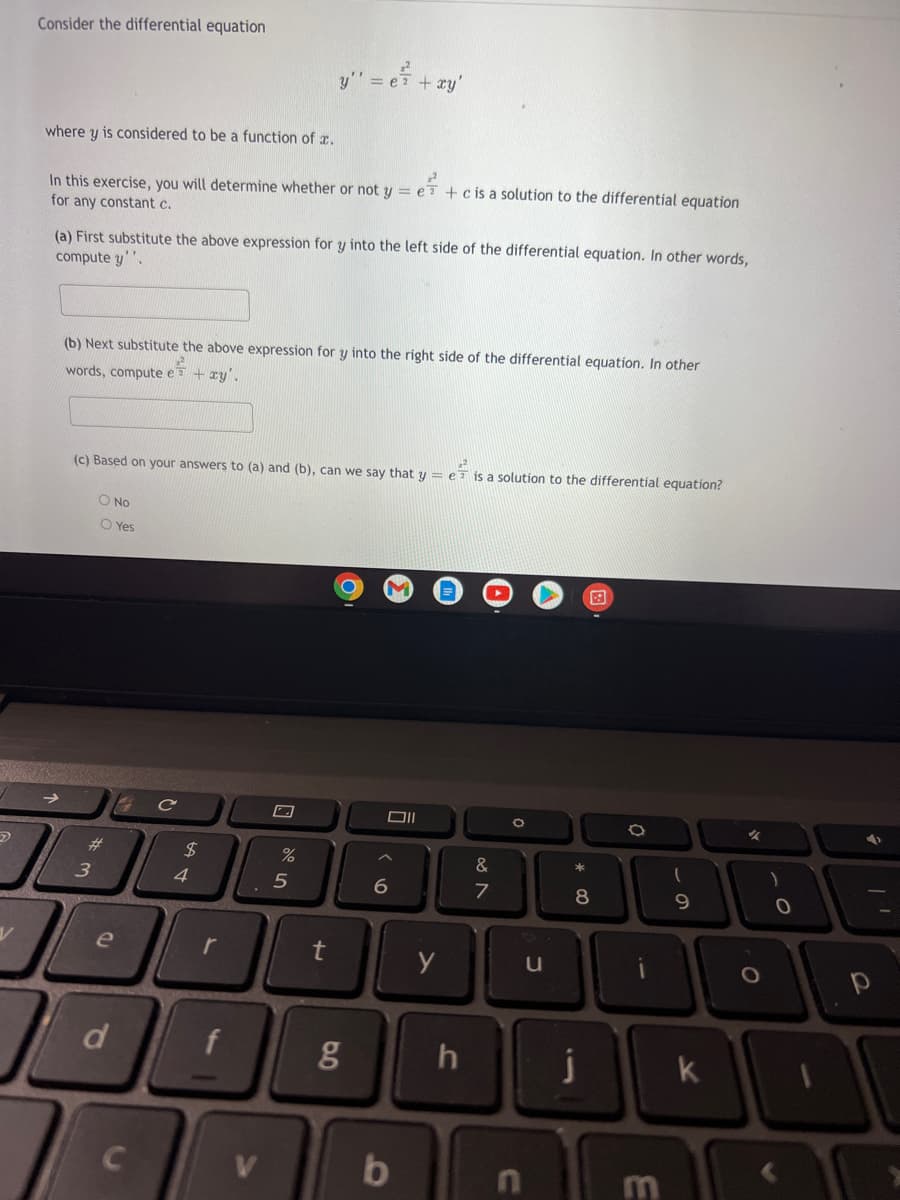Consider the differential equation y" = e² + zy' where y is considered to be a function of a. In this exercise, you will determine whether or not y = eT + c is a solution to the differential equation for any constant c. (a) First substitute the above expression for y into the left side of the differential equation. In other words, compute y''. (b) Next substitute the above expression for y into the right side of the differential equation. In other words, compute e + xy'. (c) Based on your answers to (a) and (b), can we say that y = e is a solution to the differential equation? O No O Yes
Consider the differential equation y" = e² + zy' where y is considered to be a function of a. In this exercise, you will determine whether or not y = eT + c is a solution to the differential equation for any constant c. (a) First substitute the above expression for y into the left side of the differential equation. In other words, compute y''. (b) Next substitute the above expression for y into the right side of the differential equation. In other words, compute e + xy'. (c) Based on your answers to (a) and (b), can we say that y = e is a solution to the differential equation? O No O Yes
Calculus: Early Transcendentals
8th Edition
ISBN:9781285741550
Author:James Stewart
Publisher:James Stewart
Chapter1: Functions And Models
Section: Chapter Questions
Problem 1RCC: (a) What is a function? What are its domain and range? (b) What is the graph of a function? (c) How...
Related questions
Question

Transcribed Image Text:Consider the differential equation
y" = ef + zy'
where y is considered to be a function of a.
In this exercise, you will determine whether or not y = e + c is a solution to the differential equation
for any constant c.
(a) First substitute the above expression for y into the left side of the differential equation. In other words,
compute y''.
(b) Next substitute the above expression for y into the right side of the differential equation. In other
2
words, compute e + xy'.
(c) Based your answers to (a) and (b), can we say that y = e is a solution to the differential equation?
O No
O Yes
C
O
O
4
#
3
$
4
e
D
d
C
r
f
A
%
2 50
t
g
Oll
6
b
y
h
&
7
u
n
*
8
j
m
(
9
k
O
)
0
Expert Solution
This question has been solved!
Explore an expertly crafted, step-by-step solution for a thorough understanding of key concepts.
Step by step
Solved in 4 steps

Recommended textbooks for you

Calculus: Early Transcendentals
Calculus
ISBN:
9781285741550
Author:
James Stewart
Publisher:
Cengage Learning

Thomas' Calculus (14th Edition)
Calculus
ISBN:
9780134438986
Author:
Joel R. Hass, Christopher E. Heil, Maurice D. Weir
Publisher:
PEARSON

Calculus: Early Transcendentals (3rd Edition)
Calculus
ISBN:
9780134763644
Author:
William L. Briggs, Lyle Cochran, Bernard Gillett, Eric Schulz
Publisher:
PEARSON

Calculus: Early Transcendentals
Calculus
ISBN:
9781285741550
Author:
James Stewart
Publisher:
Cengage Learning

Thomas' Calculus (14th Edition)
Calculus
ISBN:
9780134438986
Author:
Joel R. Hass, Christopher E. Heil, Maurice D. Weir
Publisher:
PEARSON

Calculus: Early Transcendentals (3rd Edition)
Calculus
ISBN:
9780134763644
Author:
William L. Briggs, Lyle Cochran, Bernard Gillett, Eric Schulz
Publisher:
PEARSON

Calculus: Early Transcendentals
Calculus
ISBN:
9781319050740
Author:
Jon Rogawski, Colin Adams, Robert Franzosa
Publisher:
W. H. Freeman


Calculus: Early Transcendental Functions
Calculus
ISBN:
9781337552516
Author:
Ron Larson, Bruce H. Edwards
Publisher:
Cengage Learning